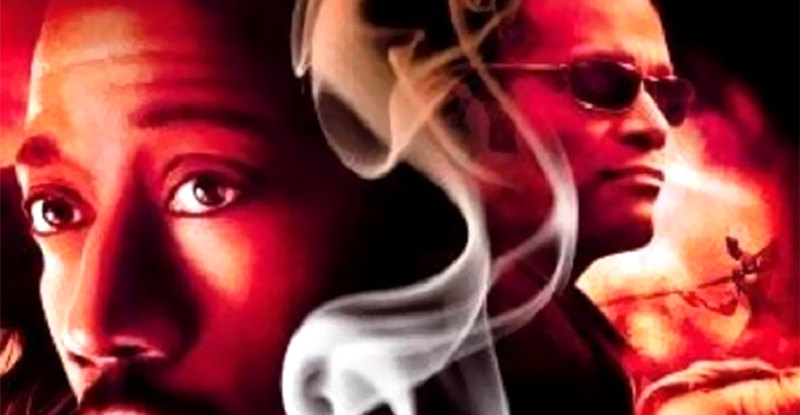After spending 12 years as a camera operator for TV shows and films, Geoffrey Haley wrote and directed this quirky romantic comedy about a poet who makes a living writing suicide notes. As you might expect, considering the director’s background, this little indie film is nicely blocked and framed, using shot after shot that adds interest without distraction.
For the first two acts, “The Last Word” hums along at a pleasant pace for an indie flick, powered by three stars and a situation that makes you wonder whether it’s going to end as gracefully as this poet’s clientele, or if it will sputter. Then the third act comes, and it’s as if it occurred to Haley he was making an independent film and he had better steer clear of the romantic comedy that this little production wanted to become. That’s when the film disappoints–when it gets all “indie serious” and heavy-handed, after 75-80 minutes of wry, dark comedy.
“The Last Word” is likable enough in the early going. We meet Evan Merck (Wes Bentley, “American Beauty”), who consults with his clients and assembles a file on each containing childhood and adult photos, anecdotes, personal histories, and the client’s thoughts on certain things. Then he puts it all together into one last poignant, intelligent document that will wow survivors. The process, which includes rewrites and client approval at several stages, takes about a month, which prompts a droll, sarcastic new client (Ray Romano) too ask, “How many, actually . . . you know, pull the trigger? Thirty percent, Merck tells him. That number raises all sorts of questions for viewers, though. Is Merck actually providing a service by making them wait the equivalent of a hand-gun purchase waiting period? Is it the interaction and/or self-reflection that causes most of them to change their minds? How does he feel about what he does? When does he feel the most job gratification, after a client actually uses his note, or when the clients never “pull the trigger”? And how does he get his clients, anyway? Well, only the last question is answered, as we see him accessing his website, which is called The Last Word. And that’s really too bad, because this little film could have had considerably more depth if those other issues had been explored.
Bentley, who was Blackheart in “Ghost Rider,” plays it halfway between a brooding poet and an undertaker. When we see him standing on the periphery of a funeral, taking notes, it’s like watching an episode of “Six Feet Under,” only we wonder, why does he have to show up at every funeral? He’s so far away that it’s impossible to overhear what people are saying, if its feedback he’s looking for. And why does he do this? Nowhere in this 94-minute film do I begin to understand what really makes this guy do what he does. Certainly there are other ways to make money. Isn’t the suicide note business a little predatory? A little pathetic?
Maybe, but to the sister of one recently departed client, he’s more attractively mysterious than anything. Charlotte (Winona Ryder) confronts him and asks how he knew her brother. Not wanting to expose himself, he lies, saying he was a friend. And the more persistent she gets, the deeper into his lie he gets. Ryder makes a fine quasi-stalker who proves that she hasn’t lost any of her acting chops, despite her own well-publicized personal problems. But it’s Romano who, cast against type, delivers a performance that will surprise his fans. There’s nary a smile from this guy, and he gets so into his character that you believe he’s really that tunnel-visioned about ending his life, but doing it in a well-considered manner. It’s the scenes with Romano that peak the audience’s interest the most, for we hope to gain some sense into a) the mind of a suicidal, and b) the mind of someone who’s either exploiting or helping them. And it would be nice to know which Haley thinks is the case.
I’m not going to throw any spoilers at you, which means I’m not about to go into the details of what’s wrong with the third act, except to reiterate that “The Last Word” takes an abrupt turn and the tone changes dramatically before a denouement that seems to facile. Despite that, it’s still a sound effort from Haley and his stars, with just enough quirkiness to keep it afloat.
Video:
The AVC/MPEG-4 transfer to a BD-25 is a good one, with a warm and natural color palette and sharp-enough edges and detail to make viewing a rewarding experience. Flesh tones are right on, though the depth could have been a little better. “The Last Word” is presented in 2.35:1 aspect ratio.
Audio:
The featured audio is a DTS-HD 5.1 Master Audio, with a Dolby Digital 5.1 option and subtitles in English SDS and Spanish. There’s a nice spread across the front speakers, but the rear surround sound speakers are dormant as ancient volcanoes and it’s not exactly a dynamic track. What’s here is a clean mix with good balance among the dialogue, music, and Foley effects, with no distortion that often accompanies indie flicks.
Extras:
Not much here–just a handful (if you have six digits) of deleted scenes, a photo gallery, and a trailer, the kind of stuff we dismiss on “loaded” DVDs and Blu-rays. The cutting-room floor stuff runs roughly 10 minutes, while you can flip through the stills in under a minute. Better than nothing? Yeah, but just barely.
Bottom Line:
“The Last Word” is far from the last word on romantic comedies, but it’s still worth watching. I don’t know about repeats, though. The script may be intelligent, but there just aren’t enough memorable lines or performances to make you keep coming back for more.


